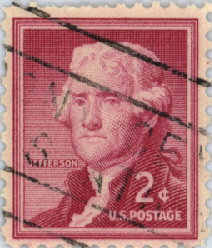 was important that the transition was effected by strictly constitutional means. Jefferson emphasized this in his conciliatory inaugural address.
was important that the transition was effected by strictly constitutional means. Jefferson emphasized this in his conciliatory inaugural address.
*** Previous ***
Jefferson and his running mate Aaron Burr defeated John Adams in the elections of 1800. Jefferson's own title to the presidency was not established for some weeks because he was tied with his running mate under the workings of the original electoral system. The election was thrown into the House of Representatives. The Federalists voted for Burr through many indecisive ballots. Finally, enough of them abstained to permit the obvious will of the majority to be carried out. And so Jefferson became the 3d president of the United States of America. And what also  was important that the transition was effected by strictly constitutional means. Jefferson emphasized this in his conciliatory inaugural address.
was important that the transition was effected by strictly constitutional means. Jefferson emphasized this in his conciliatory inaugural address.
His first term as president was rather succesfull. That had various reasons. First, he was the undisputed leader of a party that had aquired cohesion during its years in opposition.
Second, he had loyal and competent lieutenants like the secratary of State, James Madison, and the secratary of the Treasury, Albert Gallatin.
And, last but not least, he was very popular because of his policy of economy and his tax reduction.
Jefferson restored the party balance in the civil service, but he was relativly unsuccesful in his moves against the judicirary, which had been reinforced by fresh Federalist appointees at the very end of the Adams administration.
The effort to remove partisan judges by impeachment was a virtiual failure, and the Federalists remained entrenched in the judiciary, though they became less actively partisan.
The most notable achievement of Jefferson's precidency was the purchase of Louisiana in 1803. Robert R. Livingston and James Monroe were sent to France to negotiate with Napoleon. The treaty they sent home aroused constitutional scruples in Jefferson's mind. It seemed to him that this vast and large acquisition of territory would change the charracter of the Union. And so it should be authorized by a constitutional amendment. But he recognized that there was no time for such a slow procedure otherwise the purchase could be in danger. And so became Louisiana, for 15 million dollars, a part of the United States.
Although he was still the undisputed leader of his party, Jefferson encountered greater difficulties, on both the domestic and foreign fronts, in his second term than in his first. One of the domestic problems was the Burr-Conspiracy. Former vice president Burr stood on trial for treason. But the rulings of judge John Marshall made conviction impossible. And Jefferson erred gravely in saying in advance that Burr's guilt was beyond dispute.
One of the largest foreign problems was the Embargo adopted in december 1807. It was regarded by Jefferson as the only alternative to war and submission. The act barred all exports to Britain and France. But it had less effect abroad than had been expected and caused economic difficulty at home. Toward the end of his administation, he assented to the embargo's repeal, to save the Union, he said. Amore moderate measure was adopted, but it did not avert war with Britain in 1812.
Jefferson was succeeded as president in 1809 by his loyal lieutenant, James Madison. During the last 17 years of his live, Jefferson remained in Virginia. As the 'Sage of Monticello' he engaged in a vast and rich correspondence with John Adams and others. Jefferson's last great public service was the founding of the University of Virginia in 1819. He died at Monticello on July 4, 1826 on the 50th anniversary of the Declaration of Independence.